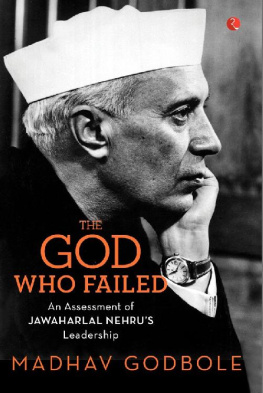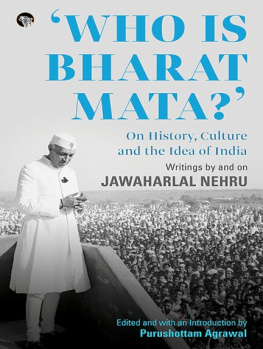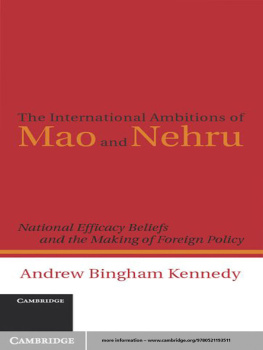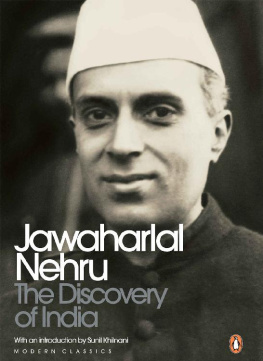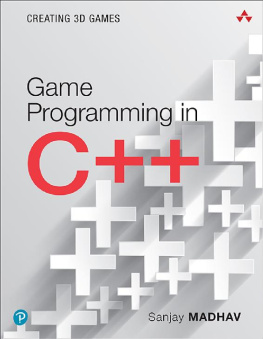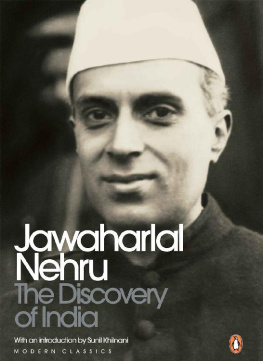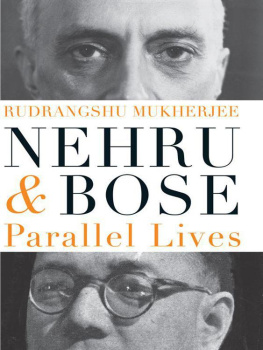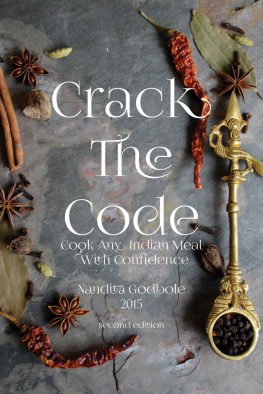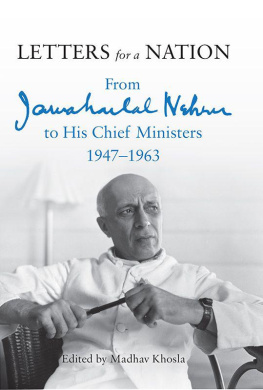Madhav Godbole - The God Who Failed: An Assessment of Jawaharlal Nehru’s Leadership
Here you can read online Madhav Godbole - The God Who Failed: An Assessment of Jawaharlal Nehru’s Leadership full text of the book (entire story) in english for free. Download pdf and epub, get meaning, cover and reviews about this ebook. year: 2014, publisher: Rupa Publications, genre: Art. Description of the work, (preface) as well as reviews are available. Best literature library LitArk.com created for fans of good reading and offers a wide selection of genres:
Romance novel
Science fiction
Adventure
Detective
Science
History
Home and family
Prose
Art
Politics
Computer
Non-fiction
Religion
Business
Children
Humor
Choose a favorite category and find really read worthwhile books. Enjoy immersion in the world of imagination, feel the emotions of the characters or learn something new for yourself, make an fascinating discovery.
- Book:The God Who Failed: An Assessment of Jawaharlal Nehru’s Leadership
- Author:
- Publisher:Rupa Publications
- Genre:
- Year:2014
- Rating:5 / 5
- Favourites:Add to favourites
- Your mark:
- 100
- 1
- 2
- 3
- 4
- 5
The God Who Failed: An Assessment of Jawaharlal Nehru’s Leadership: summary, description and annotation
We offer to read an annotation, description, summary or preface (depends on what the author of the book "The God Who Failed: An Assessment of Jawaharlal Nehru’s Leadership" wrote himself). If you haven't found the necessary information about the book — write in the comments, we will try to find it.
Madhav Godbole: author's other books
Who wrote The God Who Failed: An Assessment of Jawaharlal Nehru’s Leadership? Find out the surname, the name of the author of the book and a list of all author's works by series.
The God Who Failed: An Assessment of Jawaharlal Nehru’s Leadership — read online for free the complete book (whole text) full work
Below is the text of the book, divided by pages. System saving the place of the last page read, allows you to conveniently read the book "The God Who Failed: An Assessment of Jawaharlal Nehru’s Leadership" online for free, without having to search again every time where you left off. Put a bookmark, and you can go to the page where you finished reading at any time.
Font size:
Interval:
Bookmark:
THE GOD WHO FAILED
OTHER BOOKS BY THE AUTHOR
Good Governance: Never on Indias Radar (2014)
Indias Parliamentary Democracy on Trial (2011)
The Judiciary and Governance in India (2008)
The Holocaust of Indian Partition: An Inquest (2006)
Public Accountability and Transparency:
The Imperatives of Good Governance (2003)
The Changing Times: A Commentary on Current Affairs (2000)
Unfinished Innings: Recollections and Reflections of a Civil Servant (1996)
Rural Employment Strategy: A Quest in the Wilderness (1990)
Public Expenditures in Maharashtra: A Case For Expenditure Strategy (1989)
Industrial Dispersal Policies (1978)

Published by
Rupa Publications India Pvt. Ltd 2014
7/16, Ansari Road, Daryaganj
New Delhi 110002
Copyright Madhav Godbole 2014
All rights reserved.
No part of this publication may be reproduced, transmitted, or stored in a retrieval system, in any form or by any means, electronic, mechanical, photocopying, recording or otherwise, without the prior permission of the publisher.
The views and opinions expressed in this book are the authors own and the facts are as reported by him/her which have been verified to the extent possible, and the publishers are not in any way liable for the same.
ISBN: 978-81-291-3559-9
First impression 2014
10 9 8 7 6 5 4 3 2 1
The moral right of the author has been asserted.
This book is sold subject to the condition that it shall not, by way of trade or otherwise, be lent, resold, hired out, or otherwise circulated, without the publishers prior consent, in any form of binding or cover other than that in which it is published.
To Sujata,
my wife and companion of the last fifty years,
for standing by me through thick and thin
and bearing with me
CONTENTS
PREFACE
By any measure, Jawaharlal Nehrus contribution to building modern India is phenomenal. No other leader since independence, except Mahatma Gandhi and Vallabhbhai Patel, has been so towering a figure on Indias horizon. But, public opinion, and particularly the intelligentsia, has now turned into Nehru-baiters. Nehru is blamed for all the ills afflicting the country. In retrospect, it is often easy to blame the persons who were at the helm of affairs. But, rather than being judgemental, wherever possible, I have tried to understand the compulsions under which certain decisions were taken.
Eventually, every leader gets associated with and becomes the leader of a state, a district, caste, community, or language group. There are only two exceptions to thisMahatma Gandhi and Jawaharlal Nehru. Even Vallabhbhai Patel has not escaped such a categorization.
As I commenced work on this book, my mind went back to my first impressions of and association, howsoever remote, with Nehru during my younger days. My first recollection is of seeing Nehru in Nashik during the Congress session in 1950. Nehru was in an open car, as he often preferred. There were massive crowds and I, as a school boy, could not see Nehru. Our family friend, Vasunana Gogte, lifted me up and placed me on his shoulders so that I could get a good view. There he was. A very handsome, glowing, agile figure with an endearing smile and a red rose in his achkan lapel. It is not surprising that he was called the last Viceroy of India! The next time I saw him was when I had passed the competitive examination and was selected for the Indian Foreign Service (IFS). Those selected for the IFS were called for a briefing in Delhi. My colleague, A. Ashwathnarayan, from Karnataka and I had decided to opt for the Indian Administrative Service (IAS), instead of the IFS. When we called on the foreign secretary in the Ministry of External Affairs, Ashwath and I indicated our inclination to join the IAS. He asked us to think about the matter further. We told him that our minds were made up; it was our final option. The next day, we were taken to meet the prime minister. We were a small group of eight probationers, sitting in a semi-circle in front of his office table. Nehru, perched on the table in an informal manner, talked to us for about half an hour. The foreign secretary told the prime minister that Ashwathnarayan and I preferred to join the IAS rather than the IFS. Nehru was very gracious about it and assured us that there was much to do in the IAS as well. This meeting was the highlight of our lives.
According to the rules, IFS officers are not permitted to marry foreigners. Our batch mate, M.K. Khisha, who came from the Northeast, was posted in Spain on the completion of his training. There he fell in love with a charming young beauty, Gloria. They decided to get married but IFS rules came in the way and permission was denied. Khisha was heart-broken but Gloria did not lose hope. She wrote a letter in her own handwriting to Nehru, beseeching him to grant their request. As luck would have it, her letter was picked from the heap of incoming letters and placed before Nehru who magnanimously agreed to their request and thus Khisha and Gloria were united for life.
It was sheer coincidence that I was posted as the chief executive officer of the Nashik Zilla Parishad in early 1964. After Nehrus death, Nashik was selected as the location for the ashes immersion ceremony by the government of Maharashtra. The district collector and I were made responsible for making all the arrangements. This was yet another occasion which brought me close to Nehru though in very tragic circumstances. These recollections flooded my mind as I got down to researching for this book.
With the Lok Sabha elections held in AprilMay 2014, Nehrus contribution and legacy, and his inter-personal relationship with Vallabhbhai Patel have, once again, come to the fore, but in a partisan manner. The question of how India would have fared if Patel, instead of Nehru, had become the first prime minister, is also being debated.
Nehrus life is unique in that it is the veritable history of modern Indiaboth pre- and post-independence India. Writing about Nehru means reliving history in every sense of the term. Unfortunately, rather than the merits and demerits of the point, it is often the loyalty to the NehruIndira Gandhi first family which holds sway in such discussions. This trait of worshipping heroes is long embedded in the Indian psyche. In his closing speech in the Constituent Assembly, B.R. Ambedkar, Chairman of the Drafting Committee had, inter alia, emphasized:
We must observe the caution which John Stuart Mill has given to all who are interested in the maintenance of democracy, namely, not to lay their liberties at the feet of even a great man, or to trust him with powers which enable him to subvert their institutions. There is nothing wrong in being grateful to great men who have rendered life-long services to the country. But there are limits to greatness. As has been well said by the Irish patriot Daniel OConnell, no man can be grateful at the cost of his honour, no woman can be grateful at the cost of her chastity and no nation can be grateful at the cost of its liberty. This caution is more necessary in the case of India than in the case of any other country, for in India, Bhakti, or what may be called the path of devotion or hero-worship, plays a part in its politics unequalled in magnitude by the part it plays in the politics of any other country in the world. Bhakti in religion may be a road to the salvation of the soul. But in politics, Bhakti or hero-worship is a sure road to degradation and to eventual dictatorship. (Mukherjee 2007; pp. 21718)
Next pageFont size:
Interval:
Bookmark:
Similar books «The God Who Failed: An Assessment of Jawaharlal Nehru’s Leadership»
Look at similar books to The God Who Failed: An Assessment of Jawaharlal Nehru’s Leadership. We have selected literature similar in name and meaning in the hope of providing readers with more options to find new, interesting, not yet read works.
Discussion, reviews of the book The God Who Failed: An Assessment of Jawaharlal Nehru’s Leadership and just readers' own opinions. Leave your comments, write what you think about the work, its meaning or the main characters. Specify what exactly you liked and what you didn't like, and why you think so.

